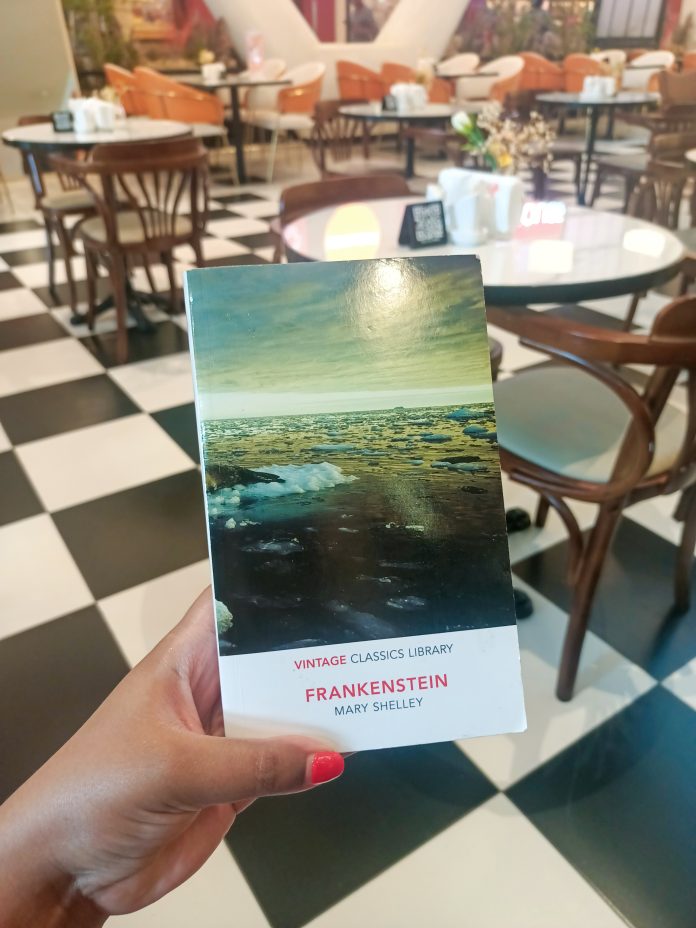For our October pick, the Zeda Book Club read the classic Frankenstein by Mary Shelley, a haunting, deeply emotional, and surprisingly intimate novel that explores creation, loneliness, responsibility, and the yearning to be loved. Equal parts gothic tale and philosophical reflection, Frankenstein invites us to consider what it means to be human, and what happens when our desire for greatness eclipses our capacity for compassion.
Mary Shelley wrote Frankenstein at just 18 years old, during a summer in 1816 that became famous as “the year without a summer,” when she, Percy Bysshe Shelley, Lord Byron, and others challenged each other to write ghost stories. Born Mary Wollstonecraft Godwin, she was the daughter of two radical thinkers: feminist philosopher Mary Wollstonecraft and political theorist William Godwin. So she grew up surrounded by ideas about revolution, morality, science, and human rights.
Her mother died shortly after her birth, and this early loss, combined with her unconventional upbringing and her relationship with the married man she eloped with Percy Shelley, shaped her interest in creation, motherhood, and the consequences of abandonment. Writing Frankenstein within this intellectual, emotional, and political context allowed her to produce a novel that was far ahead of its time, probing the ethics of science, the responsibilities of parenthood, and the deep human need for love and belonging.
The novel follows Victor Frankenstein, an ambitious young scientist who creates life but recoils from it in fear, abandoning the being he has brought into the world. The Creature, intelligent, sensitive, and eager to belong, learns about humanity through observation and rejection. What follows is a tragic journey shaped by longing, isolation, and grief, as both creator and creation become bound to each other by harm and heartbreak. It is a story that asks us to sit with discomfort: Who is the monster, and who made him that way?
One of the themes that stood out for us was how Frankenstein explores the emotional damage of neglect and abandonment. The Creature does not begin violent, but becomes so in response to rejection, cruelty, and loneliness. This sparked a conversation in our book club about the formative power of love, acceptance, and responsibility. How do we learn tenderness when tenderness is never extended to us? What are the emotional consequences of bringing someone (or something) into existence without care?
We also watched the latest Frankenstein film adaptation by Guillermo del Toro together on the same day! It is a visually stunning and emotionally resonant adaptation that returns the story to its literary roots. Unlike older film versions that lean heavily into horror or reduce the Creature to a lumbering monster, del Toro portrays him exactly as Mary Shelley wrote him. Though not a faithful adaptation in terms of plot, it’s a beautiful interpretation that portrays the Creature as intelligent, sensitive, and deeply human.
The film explores the emotional core of the novel: abandonment, loneliness, the hunger to belong, the moral weight of creation and the tragedy of dysfunctional father-son relationships. It also refuses to soften Victor Frankenstein, instead showing him as the true source of the tragedy, driven by ego and undone by his inability to take responsibility for the life he brings into the world.
Guillermo Del Toro restores the Creature’s voice and interiority in a way few adaptations have attempted. The result is a film that feels haunting and intimate rather than sensational. Gothic, lush, and emotionally faithful, it stands out as the most thoughtful screen interpretation of Frankenstein to date, that truly honours Shelley’s themes while giving the Creature the depth and dignity he has long been denied.
Experiencing both versions side by side allowed us to see the emotional core of the story more clearly. And yes, we reminded ourselves more than once: Frankenstein is the Creator not the Creature! Which is part of the tragedy of it all! To remain nameless, to have your father not even bother to name you. It was a wonderful day indeed as we enjoyed a story that is over 200 years old, and will probably long outlive us much like Frankenstein’s creation, through different mediums and lenses.
Verdict
Frankenstein is a timeless, emotionally rich story that has endured for a reason. Mary Shelley gives us a narrative that is both gothic and deeply human, asking us to confront themes of isolation, accountability, and the universal longing to be seen and loved.
At Zeda Book Club, the book sparked thoughtful discussion about unfettered ambition, patriarchy, dysfunction in families, empathy, the ethics of creation, human carelessness especially now with our strides in tech and science, and how our need for belonging shapes our lives. Experiencing the book and the film together made the story feel vivid, present, and deeply moving. For anyone interested in classics that still feel urgent, Frankenstein is a powerful and rewarding read.
Zeda Book Club is open to women to join. We café hop and read a new book every month. We meet on the first Sunday of each month in Nairobi. Join the group here. Happy reading!








